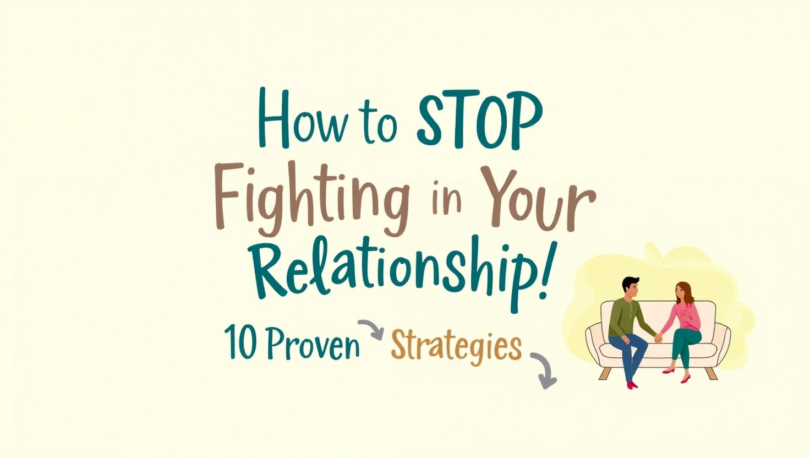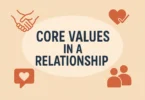Every couple argues—it’s a natural part of any relationship (Fighting in Relationship). But when small disagreements turn into constant fights, it can create stress, emotional distance, and even long-term damage. If you and your partner find yourselves stuck in a cycle of conflicts, it’s time to break free and build a healthier, more peaceful relationship.
The good news? You don’t have to let arguments define your relationship. By understanding the root causes of fights and implementing proven conflict resolution strategies, you can stop the cycle of negativity and strengthen your bond. In this guide, we’ll explore 10 expert-backed strategies that will help you improve communication, resolve conflicts effectively, and foster a deeper emotional connection with your partner.
Ready to bring more harmony into your relationship? Let’s dive in! 🚀
Headlines
Understanding Why Couples Fight
10 Proven Strategies to STOP Fighting in Your Relationship
Strengthening Your Relationship to Prevent Fights
Understanding Why Couples Fight
Common Causes of Fighting in Relationship
Fighting in Relationship is an inevitable part of any relationship, but understanding its root causes can help couples address issues before they escalate into full-blown fights. Here are some of the most common reasons why couples argue and how they can impact a relationship.
1. Differences in Communication Styles
Not everyone communicates the same way, and when partners have different communication styles, misunderstandings can arise. Some people are direct and assertive, while others are more passive or even avoidant. When one partner prefers open and honest discussions while the other tends to withdraw or shut down, it can create frustration and resentment.
- Example: One partner wants to talk about an issue immediately, while the other needs time to process their emotions before discussing it. This mismatch can lead to one person feeling pressured and the other feeling ignored.
- Solution: Understanding and respecting each other’s communication styles can help prevent unnecessary fights. Practicing active listening and using calm, non-confrontational language can also bridge communication gaps.
2. Unmet Expectations and Unspoken Needs
Every individual enters a relationship with certain expectations—whether about love, support, household responsibilities, or emotional availability. When these expectations aren’t met or communicated properly, disappointment can turn into resentment, leading to frequent arguments.
- Example: One partner may expect frequent displays of affection, while the other assumes their love is understood without verbal affirmations. If these needs aren’t discussed, it can lead to feelings of neglect or frustration. (Fighting in Relationship)
- Solution: Open and honest communication about expectations is key. Understanding each other’s love languages (as described by Gary Chapman) can help partners express love in ways that truly resonate with their significant other.
3. Financial Stress and Money Disagreements
Money is one of the leading causes of Fighting in Relationship. Differences in spending habits, saving priorities, or financial responsibilities can cause tension, especially if one partner feels like they are carrying more of the financial burden than the other.
- Example: One person may be a saver while the other is a spender, leading to frustration over budgeting and financial planning. (Fighting in Relationship)
- Solution: Creating a shared financial plan and discussing money matters openly can help couples manage finances as a team. Setting financial goals together and respecting each other’s financial habits can also reduce stress in this area.
4. Emotional Triggers and Past Baggage
Sometimes, conflicts aren’t just about the present situation but are tied to emotional triggers from past experiences. Childhood traumas, past relationships, or unresolved personal issues can resurface in a relationship, leading to overreactions or heightened emotional responses.
- Example: A partner who grew up in a household with constant criticism may be extra sensitive to feedback, interpreting constructive criticism as an attack. (Fighting in Relationship)
- Solution: Developing emotional intelligence and self-awareness can help individuals recognize their triggers. Therapy or journaling can also be helpful in identifying and addressing past wounds that affect current relationships.
5. Lack of Quality Time and Emotional Disconnection
When life gets busy with work, responsibilities, or raising a family, couples may struggle to prioritize quality time together. Emotional distance can grow, making small irritations feel bigger than they actually are.
- Example: One partner feels neglected because their significant other spends too much time on work or social media instead of engaging in meaningful conversations. (Fighting in Relationship)
- Solution: Prioritizing intentional time together—such as weekly date nights or screen-free conversations—can help couples reconnect emotionally and strengthen their bond.
6. Household Responsibilities and Role Imbalances
Disagreements over household chores, parenting responsibilities, or gender role expectations can lead to frequent fights, especially if one partner feels they are doing more than their fair share.
- Example: One person feels burdened by constantly cleaning up, while the other doesn’t realize the imbalance. Over time, this can create resentment. (Fighting in Relationship)
- Solution: Having clear and fair agreements about household responsibilities can reduce tension. Regular check-ins about chores and a team-oriented mindset can also make daily life more harmonious.
Final Thoughts
While conflicts are natural in any relationship, understanding why they happen is the first step toward resolution. By identifying the root causes—whether it’s communication differences, unmet expectations, financial stress, emotional baggage, lack of quality time, or role imbalances—couples can take proactive steps to prevent small issues from turning into ongoing fights.
Want to learn how to stop fighting in your relationship and create lasting peace? Keep reading for 10 proven strategies that will help you resolve conflicts and strengthen your connection. 🚀
The Role of Emotional Intelligence in Conflict (Fighting in Relationship) Resolution
Emotional intelligence (EI) plays a crucial role in maintaining a healthy relationship and preventing conflicts from escalating. When couples develop strong emotional intelligence, they can better understand their own emotions, empathize with their partner, and communicate effectively during disagreements. In this section, we’ll explore how emotional intelligence can help resolve conflicts and foster a deeper, more harmonious relationship.
1. Understanding Emotional Intelligence in Relationships
Emotional intelligence refers to the ability to recognize, understand, and manage both your own emotions and those of your partner. According to psychologist Daniel Goleman, EI consists of five key components:
- Self-awareness – Understanding your own emotions and how they affect your thoughts and behaviors.
- Self-regulation – Managing emotions in a healthy way, avoiding impulsive reactions.
- Motivation – Using emotions to drive positive actions and relationship growth.
- Empathy – Recognizing and understanding your partner’s emotions and perspectives.
- Social skills – Communicating effectively, resolving conflicts, and fostering healthy interactions.
When couples develop these skills, they can navigate disagreements with understanding and patience, rather than reacting impulsively out of frustration or anger.
2. How Self-Awareness Helps Prevent Fights
One of the biggest reasons conflicts escalate is because people react emotionally without understanding their triggers. Self-awareness helps individuals recognize what upsets them and why, making it easier to communicate their feelings without blaming their partner.
Example:
Sarah becomes irritated when her partner forgets to do household chores, but instead of expressing her frustration calmly, she reacts by criticizing him. If Sarah practiced self-awareness, she might recognize that her frustration isn’t just about chores—it’s about her deeper need to feel supported and valued. (Fighting in Relationship)
Solution:
By identifying personal emotional triggers, partners can learn to express their feelings in a more constructive way. Instead of saying, “You never help me around the house!”, Sarah could say, “I feel overwhelmed when I handle all the chores alone. Can we divide them more evenly?”
Key Takeaway: Recognizing your emotions before reacting can prevent unnecessary fights and foster open communication.
3. The Power of Emotional Regulation in Conflict Resolution
Emotional regulation is the ability to manage emotions effectively instead of letting them control your reactions. In relationships, partners who struggle with emotional regulation may resort to yelling, stonewalling, or shutting down during conflicts.
How Emotional Regulation Can Help:
- Prevents knee-jerk reactions that escalate arguments.
- Encourages calm, rational discussions instead of emotional outbursts.
- Reduces defensiveness, allowing for productive problem-solving.
Practical Tips for Emotional Regulation:
- Take a pause: If emotions are running high, take a deep breath and step away for a moment before responding.
- Use mindfulness techniques: Practicing deep breathing, journaling, or meditation can help regulate emotions over time.
- Choose your words wisely: Instead of lashing out, focus on solutions. Replace “You’re so inconsiderate!” with “I feel hurt when I don’t feel heard.”
Key Takeaway: Managing emotions allows couples to handle disagreements maturely and productively rather than letting emotions drive the conversation.
4. The Role of Empathy in Strengthening Connection
Empathy—the ability to understand and share your partner’s feelings—is one of the most powerful tools for resolving conflicts. When both partners feel heard and understood, they are less likely to become defensive and more likely to work together toward a resolution. (Fighting in Relationship)
How to Practice Empathy in Conflict Resolution:
- Active listening: Instead of planning your next response while your partner is speaking, focus on truly understanding their perspective.
- Validate their emotions: Even if you don’t agree, acknowledge their feelings. Saying “I can see why you feel that way” can go a long way in defusing tension.
- Put yourself in their shoes: Ask yourself, “How would I feel if I were in their position?”
Example:
Mark and Lisa argue frequently about Mark’s long work hours. Instead of dismissing Lisa’s concerns as “nagging,” Mark can practice empathy by recognizing that Lisa feels lonely and unprioritized. By acknowledging her feelings and finding a compromise, they can prevent resentment from building.(Fighting in Relationship)
Key Takeaway: Empathy helps transform fights into opportunities for understanding and connection.
5. Strengthening Social Skills for Healthy Communication
Effective communication is a cornerstone of emotional intelligence. Without strong social skills, even minor disagreements can turn into major conflicts.
Ways to Improve Communication in Relationships:
- Use “I” statements: Instead of blaming (e.g., “You never listen to me!”), say, “I feel unheard when I don’t get a chance to express my thoughts.”
- Avoid toxic communication patterns: Criticism, defensiveness, stonewalling, and contempt (known as Gottman’s Four Horsemen) can destroy relationships.
- Find a resolution together: Rather than trying to “win” the argument, focus on finding a compromise that satisfies both partners.
Key Takeaway: Good communication helps prevent small misunderstandings from turning into recurring conflicts.
Final Thoughts
Emotional intelligence is one of the most powerful tools for maintaining a healthy, conflict-free relationship. By developing self-awareness, regulating emotions, practicing empathy, and improving communication skills, couples can navigate disagreements with understanding and patience rather than frustration and anger.
If you and your partner find yourselves stuck in a cycle of arguments, start by strengthening your emotional intelligence—it could be the key to long-term harmony and connection.
Want more actionable strategies? Keep reading to discover 10 proven ways to STOP fighting in your relationship! 🚀
10 Proven Strategies to STOP Fighting in Your Relationship
Conflict is a natural part of any relationship, but when fights become frequent or intense, they can create emotional distance and resentment. The good news is that you can break the cycle of arguments by using practical, expert-backed strategies. Below are 10 proven strategies to help you stop fighting and build a healthier, more loving relationship.
1. Practice Active Listening
Many arguments escalate because one or both partners feel unheard. Active listening is about truly understanding your partner’s perspective rather than just waiting for your turn to speak.
How to Apply Active Listening:
- Give full attention – Put away distractions (phones, TV) and make eye contact.
- Reflect back – Summarize what your partner said to ensure clarity. Example: “So you’re feeling frustrated because you don’t feel supported with housework?”
- Ask clarifying questions – This shows you care and want to understand, rather than just reacting.
🔹 Benefit: Prevents misunderstandings and helps partners feel valued and respected.
2. Use “I” Statements Instead of “You” Statements
Blaming language often fuels defensiveness and escalates fights. Instead of accusing your partner with “You never help around the house!” try using an “I” statement.
Example:
- ❌ “You always ignore me when I talk!” (Blaming) (Fighting in Relationship)
- ✅ “I feel hurt when I don’t feel heard during our conversations.” (Non-blaming)
🔹 Benefit: Encourages open discussions without making your partner feel attacked.
3. Identify and Manage Emotional Triggers
Many fights stem from emotional triggers tied to past experiences, childhood traumas, or personal insecurities. Understanding what triggers emotional reactions can help prevent unnecessary arguments.
How to Identify Triggers:
- Reflect on what makes you react strongly in an argument.
- Ask yourself, “Is this reaction about the current situation, or is it linked to past experiences?”
- Share your triggers with your partner so they can be more mindful of your sensitivities.
🔹 Benefit: Reduces overreactions and helps both partners navigate conflicts with greater empathy.
4. Take a Timeout Before Things Escalate
When emotions run high, it’s easy to say things you’ll regret. Taking a brief timeout can help both partners calm down and gain perspective before continuing the conversation.
How to Take a Productive Timeout:
- Agree on a signal that indicates when one of you needs a break.
- Set a time limit (e.g., “Let’s take 15 minutes to cool off and then continue.”).
- Use the break to breathe, reflect, and gather thoughts, not to stew in anger.
🔹 Benefit: Prevents heated arguments from spiraling out of control.
5. Avoid Toxic Communication Patterns
Relationship expert Dr. John Gottman identified four toxic behaviors that lead to relationship failure:
- Criticism – Attacking your partner’s character instead of addressing the issue.
- Defensiveness – Making excuses instead of taking responsibility.
- Contempt – Using sarcasm, name-calling, or disrespectful behavior.
- Stonewalling – Shutting down or ignoring your partner.
How to Break These Patterns:
- Replace criticism with gentle requests.
- Take responsibility instead of being defensive.
- Show respect instead of contempt.
- Stay engaged instead of shutting down.
🔹 Benefit: Encourages healthy communication and prevents destructive cycles.
6. Focus on Solutions, Not Just Problems
Arguments often revolve around repeating problems rather than finding solutions. Shifting the focus to problem-solving can create more constructive conversations.
How to Find Solutions Together:
- Instead of rehashing past fights, ask: “How can we fix this together?”
- Brainstorm ideas and compromise where possible.
- Set small, actionable goals (e.g., “Let’s schedule a weekly date night to reconnect.”).
🔹 Benefit: Encourages teamwork and strengthens problem-solving skills in the relationship.
7. Strengthen Emotional Intimacy
Many fights occur because partners feel emotionally disconnected. Strengthening emotional intimacy can reduce frustration and increase understanding.
Ways to Build Emotional Intimacy:
- Express appreciation regularly (e.g., “I love how supportive you are.”).
- Spend quality time together without distractions.
- Be vulnerable – share thoughts, dreams, and worries with each other.
🔹 Benefit: When partners feel emotionally connected, they’re less likely to argue over small things.
8. Set Healthy Boundaries
Boundaries help establish mutual respect and prevent fights over repeated issues.
Examples of Healthy Boundaries:
- “When I’m stressed after work, I need 30 minutes to decompress before discussing serious topics.”
- “I won’t tolerate being yelled at during arguments.”
- “We agree not to discuss sensitive topics over text—only in person.”
🔹 Benefit: Creates clear expectations and prevents unnecessary conflicts.
9. Practice Forgiveness and Let Go of Resentment
Holding onto past mistakes only fuels ongoing fights. Learning to forgive and move forward is essential for a peaceful relationship.
How to Practice Forgiveness:
- Recognize that everyone makes mistakes.
- Express your feelings, but then let go of grudges.
- If necessary, seek professional help (couples therapy) to work through unresolved resentment.
🔹 Benefit: Promotes emotional healing and prevents recurring conflicts.
10. Seek Professional Help if Conflicts Persist
If fights continue despite your best efforts, seeking professional guidance from a couples therapist or relationship coach can provide valuable insights. Experts like Dr. John Gottman and Esther Perel emphasize the importance of professional intervention when communication issues persist.
When to Consider Therapy:
- If the same conflicts keep resurfacing without resolution.
- If fights involve verbal abuse, manipulation, or unhealthy power dynamics.
- If one or both partners feel emotionally disconnected or unfulfilled.
🔹 Benefit: Therapy provides practical tools to improve communication and strengthen your relationship.
Final Thoughts
Arguments are inevitable in any relationship, but they don’t have to be destructive. By implementing these 10 proven strategies, you can shift from constant fighting to open communication, empathy, and understanding.
Strengthening Your Relationship to Prevent Fights
Building Emotional Intimacy and Trust
Emotional intimacy and trust are the foundation of a strong and healthy relationship. Without them, misunderstandings, insecurity, and resentment can take root, leading to frequent arguments and emotional disconnection. Couples who actively nurture their bond tend to experience deeper connection, better communication, and a stronger sense of partnership. In this section, we’ll explore the key components of emotional intimacy and trust, along with practical ways to strengthen them in your relationship.
1. Understanding Emotional Intimacy in Relationships
Emotional intimacy is the ability to be vulnerable, open, and deeply connected with your partner. It involves sharing your thoughts, fears, dreams, and emotions without fear of judgment or rejection. When emotional intimacy is strong, both partners feel safe, valued, and understood.
Signs of Strong Emotional Intimacy:
- You feel comfortable sharing your deepest thoughts and feelings.
- You trust your partner with your vulnerabilities.
- You both feel heard and validated during conversations.
- You enjoy emotional closeness beyond just physical intimacy.
- You turn to each other for support during difficult times.
🚨 Warning Signs of Weak Emotional Intimacy:
- You feel emotionally distant or disconnected.
- Conversations stay on the surface (small talk, logistics).
- You feel hesitant to share your true feelings.
- Your partner dismisses or invalidates your emotions.
- You don’t feel emotionally supported when facing challenges.
💡 Key Takeaway: Strong emotional intimacy makes partners feel safe, secure, and deeply connected in their relationship.
2. How to Strengthen Emotional Intimacy
Building emotional intimacy takes time, effort, and consistent practice. Here are some proven strategies to deepen your connection:
a) Engage in Meaningful Conversations
Talking about daily routines is important, but true intimacy comes from deep, meaningful conversations. Take time to discuss personal thoughts, dreams, and fears with each other.
Try This:
- Ask open-ended questions, like:
- “What’s something you’ve always wanted to do but never had the chance?”
- “What’s a childhood memory that shaped who you are today?”
- Share daily gratitude by saying, “One thing I appreciate about you today is…”
🔹 Why It Works: Encourages openness and emotional bonding.
b) Show Affection and Appreciation Regularly
Physical and verbal affection strengthens emotional bonds. Small gestures of love reinforce trust and connection.
Ways to Show Affection:
- Hugs, kisses, or holding hands.
- Writing love notes or sending sweet texts.
- Complimenting your partner daily.
- Surprising them with their favorite treat or a kind gesture.
🔹 Why It Works: Regular displays of affection make your partner feel valued and loved.
c) Spend Quality Time Without Distractions
In today’s fast-paced world, couples often get caught up in responsibilities and neglect intentional quality time.
Try This:
- Weekly Date Nights: Even at home, plan a romantic dinner or game night.
- Unplug Together: Put away phones and focus on genuine connection.
- Shared Activities: Find a hobby or activity you both enjoy (cooking, hiking, reading, etc.).
🔹 Why It Works: Strengthens the bond by prioritizing time together.
d) Be Vulnerable and Open About Your Feelings
Vulnerability creates trust and closeness. When you’re honest about your emotions, your partner feels safe doing the same.
Example: Instead of saying, “You never listen to me,” try, “I feel unheard sometimes, and I just need you to listen.”
What You Can Do:
- Be honest about your feelings, even if they’re difficult.
- Let your partner see the real you, flaws and all.
- Encourage a judgment-free space where both of you can share openly.
🔹 Why It Works: Helps create a deep emotional connection based on trust.
3. The Role of Trust in a Strong Relationship
Trust is the backbone of every successful relationship. Without it, partners may feel insecure, uncertain, or even suspicious of each other.
What Trust Looks Like in a Relationship:
- You believe your partner has your best interests at heart.
- You feel safe expressing your true thoughts and emotions.
- There’s no fear of betrayal, dishonesty, or secrecy.
- You can rely on your partner for support and encouragement.
🚨 Warning Signs of Low Trust:
- You feel the need to check your partner’s phone or social media.
- You often question their words or actions.
- You struggle to open up because of past betrayals.
- One or both partners keep secrets or avoid difficult conversations.
💡 Key Takeaway: Trust is built through honesty, reliability, and emotional safety.
4. How to Rebuild Trust After Conflicts or Betrayal
If trust has been broken—whether through dishonesty, emotional neglect, or past betrayals—it can be rebuilt, but it requires patience, effort, and commitment from both partners.
Steps to Rebuild Trust:
- Open and Honest Communication – Have a candid discussion about what led to the trust issues. Avoid blame and focus on understanding and healing.
- Consistency Over Time – Trust isn’t rebuilt overnight. It requires consistent actions that show reliability and commitment.
- Transparency – Be open about your thoughts, plans, and intentions to reassure your partner.
- Forgiveness and Letting Go – If both partners are willing to move forward, let go of past resentment and focus on the present and future.
🔹 Why It Works: Rebuilding trust requires both words and actions—consistent honesty, effort, and emotional safety.
5. Overcoming Emotional Barriers in a Relationship
Sometimes, emotional intimacy and trust are blocked by unresolved issues, past traumas, or emotional walls. Identifying and addressing these barriers is crucial for a thriving relationship.
Common Emotional Barriers:
- Fear of vulnerability (not wanting to open up).
- Past relationship trauma (carrying emotional wounds).
- Avoidance of difficult conversations (fear of conflict).
- Lack of emotional expression (difficulty showing feelings).
How to Overcome These Barriers:
- Practice Self-Reflection – Identify what’s holding you back from deeper emotional intimacy.
- Communicate Openly – Share your struggles with your partner in a non-judgmental space.
- Seek Professional Help – Couples therapy can provide valuable tools to break emotional barriers.
🔹 Why It Works: Addressing emotional barriers removes obstacles to true intimacy and trust.
Final Thoughts
Building emotional intimacy and trust requires patience, effort, and consistent practice. By engaging in meaningful conversations, prioritizing quality time, being vulnerable, and practicing trust-building behaviors, couples can create a deeper and more fulfilling relationship.
Seeking Professional Help When Needed
Every relationship experiences ups and downs, but when conflicts become frequent, intense, or unresolved, seeking professional help can be a powerful step toward healing and strengthening your bond. Many couples hesitate to seek therapy due to stigma, fear, or the misconception that therapy is only for failing relationships. However, relationship counseling can provide valuable tools and insights that help couples communicate better, resolve conflicts, and rebuild emotional intimacy.
In this section, we will explore the signs that indicate you may need professional help, the benefits of relationship therapy, and the different types of professional support available.
1. Signs That You May Need Professional Help
It’s normal for couples to face challenges, but there are certain red flags that suggest outside guidance may be necessary. If any of the following signs resonate with your relationship, it might be time to consider couples counseling:
a) Repeated and Unresolved Conflicts
- Do you find yourselves having the same arguments over and over without resolution?
- Do small disagreements quickly escalate into major fights?
- Do you feel like you talk in circles without understanding each other?
If conflicts remain unresolved, resentment can build, leading to emotional distance and frustration. A therapist can help you break unhealthy cycles and develop effective communication skills.
b) Lack of Emotional or Physical Intimacy
- Do you feel emotionally distant from your partner?
- Has your physical intimacy significantly decreased?
- Do you feel more like roommates than romantic partners?
A lack of emotional connection can lead to feelings of loneliness within the relationship. Therapy can help couples reconnect, rebuild trust, and reignite emotional and physical intimacy.
c) Poor Communication and Frequent Misunderstandings
- Do conversations often turn into arguments?
- Does one or both of you feel unheard or misunderstood?
- Do you struggle to express your needs without fear of conflict?
Miscommunication is one of the biggest reasons couples struggle. A professional counselor can teach you effective communication techniques that help prevent misunderstandings and foster mutual respect.
d) Trust Issues and Betrayal
- Has there been infidelity or emotional cheating?
- Do you or your partner feel insecure about commitment?
- Is there secrecy or dishonesty affecting your relationship?
Rebuilding trust after a betrayal is challenging, but with guidance and structured healing, many couples successfully overcome trust issues and rebuild a stronger connection.
e) Feeling Stuck, Unhappy, or Contemplating Separation
- Do you feel emotionally drained and unsure about the future of your relationship?
- Have you or your partner brought up separation or divorce?
- Do you feel like you’ve tried everything but nothing seems to work?
If you’re feeling hopeless, disconnected, or unsure about the future, therapy can help clarify your emotions, provide new perspectives, and help you determine the best path forward.
💡 Key Takeaway: Seeking help doesn’t mean your relationship is failing—it means you’re committed to making it work.
2. Benefits of Seeking Professional Help
Many couples avoid therapy because they believe they should be able to fix things on their own. However, relationship experts provide valuable tools that help couples navigate challenges in a healthy and constructive way.
a) Learning Effective Conflict Resolution Skills
Therapists teach couples how to express their emotions without attacking, listen without interrupting, and resolve disagreements in a respectful manner.
🔹 Example Technique: “I feel” statements – Instead of saying “You never listen to me,” say “I feel unheard when my concerns aren’t acknowledged.”
b) Strengthening Emotional and Physical Intimacy
Many couples struggle with emotional disconnection or a lack of physical intimacy. Therapists can help identify barriers to intimacy and provide strategies to rebuild closeness.
🔹 Example Strategy: Daily emotional check-ins where partners share one positive thing about their day and one thing they are struggling with.
c) Gaining a Neutral and Unbiased Perspective
A professional counselor provides an objective, non-judgmental space where both partners feel heard. Unlike friends or family, a therapist won’t take sides—they focus on helping the relationship thrive.
d) Addressing Underlying Issues (Past Trauma, Attachment Styles, Unresolved Conflicts)
Many relationship challenges stem from past experiences, childhood wounds, or different attachment styles. Therapy can help couples understand how these factors influence their behaviors and emotions.
🔹 Example Insight: A partner who experienced emotional neglect in childhood might have difficulty opening up, leading to emotional distance in the relationship. Therapy can help address these underlying patterns.
e) Rebuilding Trust and Healing After Betrayal
Infidelity or betrayal can deeply damage trust, but professional therapy offers a structured way to rebuild honesty, transparency, and emotional safety.
🔹 Example Strategy: Creating a “rebuilding trust plan,” which includes open communication, consistent actions, and accountability measures.
💡 Key Takeaway: A trained professional can identify root causes of conflict and provide tailored solutions to help partners reconnect.
3. Types of Professional Help Available
There are different types of therapy and support options, depending on your needs:
a) Couples Therapy / Marriage Counseling
✔️ Focuses on improving communication, resolving conflicts, and rebuilding emotional connection.
✔️ Best for couples struggling with chronic arguments, intimacy issues, trust problems, or emotional disconnection.
Conducted by a licensed therapist trained in relationship dynamics.
b) Individual Therapy for Relationship Challenges
✔️ Helps individuals understand their own emotional triggers, attachment styles, and patterns in relationships.
✔️ Useful when one partner is hesitant about couples therapy but still wants to work on the relationship.
c) Online Therapy and Relationship Coaching
✔️ Virtual therapy sessions make it easier for busy couples to get professional help.
✔️ Relationship coaches provide practical advice and strategies, but they are not licensed therapists.
d) Group Therapy or Support Groups
✔️ Provides a space where couples learn from others facing similar struggles.
✔️ Great for normalizing relationship challenges and learning healthy communication techniques.
💡 Key Takeaway: Choose a therapy format that works best for your situation—whether in-person, online, or through self-improvement resources.
4. Overcoming Stigma and Hesitation About Therapy
Despite the benefits of therapy, many couples hesitate due to societal stigma, fear of judgment, or financial concerns. Here’s how to overcome these barriers:
🔹 Myth: “Therapy is only for couples on the verge of divorce.”
✅ Truth: Many happy couples use therapy to strengthen their relationship before problems escalate.
🔹 Myth: “Going to therapy means we failed.”
✅ Truth: Seeking help is a sign of commitment to growth and improvement.
🔹 Myth: “It’s too expensive.”
✅ Truth: Many therapists offer sliding-scale fees, and some insurance plans cover couples therapy.
💡 Key Takeaway: Therapy is an investment in your relationship’s long-term success and emotional well-being.
Final Thoughts
Seeking professional help is not a sign of weakness—it’s a sign of strength and commitment. If your relationship is struggling, don’t wait until it’s too late. Therapy can equip you with the tools needed to rebuild trust, improve communication, and reignite emotional intimacy.
💡 Action Step: If you’re considering therapy, start by researching local or online therapists, or discuss the idea with your partner in a non-judgmental way. A healthier, happier relationship is possible! ❤️
Conclusion: A Healthier, Happier Relationship Starts Today
Fighting in a relationship is normal, but constant conflict can weaken the bond between partners. By implementing the 10 proven strategies discussed in this guide—such as improving communication, practicing emotional intelligence, and building trust—you can break the cycle of arguments and create a more peaceful, loving connection.
It’s important to remember that healthy relationships require effort, patience, and commitment from both partners. Small, consistent changes in how you interact, listen, and respond to each other can lead to long-term improvements in your relationship.
If conflicts persist despite your best efforts, don’t hesitate to seek professional help. Therapy or counseling can provide the guidance, tools, and perspective needed to resolve deeper issues and strengthen your partnership.
💡 Final Thought: The key to a harmonious relationship isn’t about avoiding disagreements altogether—it’s about learning how to handle them with love, respect, and understanding. Start implementing these strategies today and take the first step toward a healthier, happier, and stronger relationship! ❤️








[…] For more information: How to STOP Fighting in Your Relationship! 10 Proven Strategies. […]
[…] How Tall Man Syndrome Affects Your Relationships […]